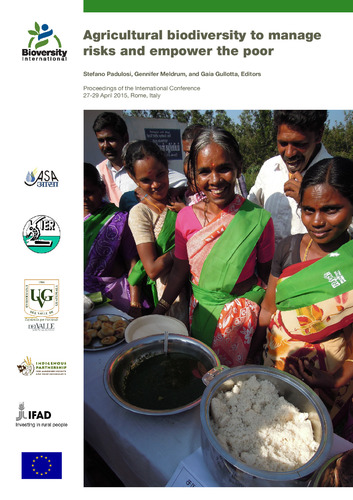Agricultural biodiversity to manage the risks and empower the poor. Proceedings of the International Conference 27-29 April 2015, Rome, Italy.
An International Conference was held in Rome, Italy 27-29 April 2015 to launch the IFAD and EU supported Project ‘Linking agrobiodiversity value chains, climate adaptation and nutrition: Empowering the poor to manage risk’. The event brought together people with different expertise to discuss the role of agricultural biodiversity in fostering more resilient livelihoods and solicit their guidance to refine the methodological framework for the Project. The consultative process was strategic for promoting the interdisciplinary dialogue that is fundamental to the Project’s ‘holistic value chain approach’.
These Proceedings share the abstracts of expert presentations delivered at the conference around range of topics related to
the multidisciplinary Project. It also shares the results of working groups that provided key inputs to refine the monitoring and intervention plan for the Project around four themes: 1) food and nutrition security under climate change, 2) value chain upgrading, 3) conservation of plant genetic resources, and 4) empowerment of vulnerable groups.
Furthermore the Proceedings shares the Project framework and site specific plans for implementation in Guatemala, India and
Mali by the partner agencies Universidad del Valle de Guatemala (UVG), Action for Social Advancement (ASA), the Institut d’Economie Rurale (IER), and the Indigenous Partnership for Agrobiodiversity and Food Sovereignty. These plans were refined through discussions at the International Conference and subsequent stakeholder consultations held in Bamako, Mali, on 15-16 June 2015, in Bhopal, India, on 19-20 June 2015 and in Guatemala City, Guatemala, on 25-66 June 2015. During these consultations, a thorough analysis of the local situation for nutrition, climate change, vulnerable groups and agricultural biodiversity was made to gain appreciation of how underutilized crops can be mobilized to enhance nutrition, livelihood resilience and income generation, which is captured in the document.

